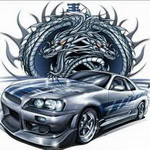

The Ultimate High-Performance SUV
Audi is taking TDI technology to a whole new level with the Audi Q7 V12 TDI quattro, the most powerful diesel-powered passenger vehicle in its class. The V12 engine under the hood generates 368 kW (500 hp) of power and 1,000 Nm (757.56 lb-ft) of torque from six liters of displacement, enabling the big SUV to perform like a sportscar. The new Audi Q7 V12 TDI quattro represents a combination of superior power and efficient fuel consumption, an Audi hallmark. With its sporty chassis, modified body and exclusive equipment, the Audi Q7 V12 TDI quattro is the consummate high-performance SUV. quattro GmbH, a wholly owned Audi subsidiary, is responsible for production and development of the vehicle. Series production of the Audi Q7 V12 TDI will begin this year.
Audi, the inventor of TDI technology, is penning a new chapter in the history of diesel engines with the Audi Q7 V12 TDI quattro. The world’s first V12 diesel engine in a series-production vehicle moves this big, high-performance SUV with supreme confidence and composure. On demand, the six-liter engine catapults the Audi Q7 from zero to 100 km/h (62.14 mph) in 5.5 seconds like a top-class sportscar. Speed is electronically capped at 250 km/h (155.34 mph).
The 12-cylinder diesel engine is no less impressive when it comes to fuel consumption. On average, it requires just 11.9 liters of fuel per 100 km (19.77 mpg), a surprisingly good figure in light of the strength of the engine. The six-liter TDI uses significantly less fuel than any competing gasoline engine in the high-performance SUV sector; thanks to efficient combustion and the complex exhaust emission control system, the Audi Q7 V12 TDI quattro already complies with future emissions standards.
Totally refined, high-tech engine
The V12 TDI captivates its drivers with sheer inexhaustible power and highly cultivated operation – the subtle engine sound takes on a voluminous, strong note when the throttle is open. The six-liter unit is a member of the modern family of Audi V engines, all of which have center-to-center spacing of 90 millimeters (3.54 inches) between cylinders. Instead of the usual 90 degrees, however, its cylinder angle measures 60 degrees. This method of construction is ideal for the V12 as it prohibits any undesirable free inertial forces and moments of inertia.
Another factor contributing to the vehicle’s smooth running characteristics is the high rigidity of the crankcase. Made of cast vermicular graphite, it is approximately 15 percent lighter than conventional gray iron. The six-liter unit is extremely compact at just 684 millimeters (26.93 inches) in length. The crankshaft is held in place by a rigid main bearing bracket. The V12 TDI’s engine capacity of 5,934 cc is derived from a bore measurement of 83.0 millimeters (3.27 inches) and a stroke of 91.4 millimeters (3.60 inches), just as in the 3.0 TDI.
The aluminum cylinder heads consist of three elements: the lower section where the intake and escape channels are integrated, the upper section which guides the flow of oil and a reinforced ladder frame containing the two camshafts driven by two simplex chains on the back of the engine. The valves are actuated by low-friction roller cam followers. Map-controlled flaps in the intake channels cause the induced air to swirl. This improves combustion, thus reducing emissions and enhancing performance.
High pressure: 2,000 bar in the common rail system
The common rail injection system, with high-pressure pumps driven by chains, can create pressure of up to 2,000 bar. The high pressure level permits intensive mixture formation of the fuel in the combustion chamber, thereby facilitating especially smooth, acoustically satisfying combustion. Shifting very rapidly and precisely, the eight-hole injectors working on the piezo principle can deliver up to five injections per combustion cycle.
Two turbochargers are positioned on the exterior of the V engine, each supplied with a cylinder bank. Thanks to their adjustable guide vane geometry, they respond quickly even at low engine speeds and reach high levels of efficiency, applying a relative maximum boost pressure of 1.6 bar. Two large charged air coolers reduce the temperature of the compressed air, paving the way for the high output of 500 hp.
Outstanding performance paired with exceptional efficiency
The six-liter TDI unit is further impressive proof of the technological leadership embodied in Audi’s “Vorsprung durch Technik” slogan. Back in 1989, the brand with the four rings put the TDI principle into series production and has been continually advancing it ever since at the forefront of the field. The most powerful diesel in its class generates an extremely high specific torque of 169 Nm (124.64 lb-ft) per liter of capacity; 1,000 Nm (757.56 lb-ft) is available at a range of 1,750 to 3,250 rpm. Specific power output is 62.0 kW (84.3 hp) – equivalent to that of a sportscar.
The new V12 TDI in the Audi Q7 is closely related to the engine that twice powered the Audi R10 TDI racing car to overall victory in the Le Mans 24 Hours – a 5.5-liter V12 that delivers approximately 480 kW (over 650 hp).
The Audi Q7 V12 TDI quattro’s powerful engine torque flows through a rapidly and gently shifting six-speed tiptronic that was specially designed for the six-liter diesel engine’s immense torque. The driver can shift the gears of the automatic transmission either with the selector lever or manually with the standard chromed shift paddles on the three-spoke steering wheel.
The quattro drive distributes the power to the front and back wheels in a 40:60 ratio – giving the vehicle a sporty, rear-focused driving style that guarantees maximum agility and driving enjoyment. When needed, the inter-axle differential transfers most of the power to the axle with better traction. Great care has also been devoted to reinforcing all key components in the quattro driveline.








1 comment:
sweet!
Post a Comment